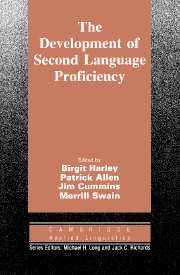Book contents
- Frontmatter
- Contents
- List of contributors
- Series editors' preface
- Acknowledgments
- Introduction
- I THE NATURE OF LANGUAGE PROFICIENCY
- II CLASSROOM TREATMENT
- III SOCIAL AND INDIVIDUAL VARIABLES
- Chapter 9 Social and individual factors in the development of bilingual proficiency
- Chapter 10 Social and individual factors in language acquisition: some models of bilingual proficiency
- Chapter 11 The role of context and age in the development of bilingual proficiency
- Chapter 12 The relationship between first and second languages: language proficiency and language aptitude
- Chapter 13 Response by DBP project members to the discussion papers of Richard Bourhis and Alison d'Anglejan
- IV PRACTICAL AND POLICY IMPLICATIONS
- V THIRTY-FIVE YEARS OF RESEARCH ON BILINGUALISM
- CONCLUSION
- References
- Author Index
- Subject Index
Chapter 13 - Response by DBP project members to the discussion papers of Richard Bourhis and Alison d'Anglejan
Published online by Cambridge University Press: 05 October 2012
- Frontmatter
- Contents
- List of contributors
- Series editors' preface
- Acknowledgments
- Introduction
- I THE NATURE OF LANGUAGE PROFICIENCY
- II CLASSROOM TREATMENT
- III SOCIAL AND INDIVIDUAL VARIABLES
- Chapter 9 Social and individual factors in the development of bilingual proficiency
- Chapter 10 Social and individual factors in language acquisition: some models of bilingual proficiency
- Chapter 11 The role of context and age in the development of bilingual proficiency
- Chapter 12 The relationship between first and second languages: language proficiency and language aptitude
- Chapter 13 Response by DBP project members to the discussion papers of Richard Bourhis and Alison d'Anglejan
- IV PRACTICAL AND POLICY IMPLICATIONS
- V THIRTY-FIVE YEARS OF RESEARCH ON BILINGUALISM
- CONCLUSION
- References
- Author Index
- Subject Index
Summary
Richard Bourhis questions the extent to which the results of the largescale Portuguese study might have been affected by methodological problems that commonly occur in this type of study. Following Gardner (1985), he suggests that the study might be vulnerable to: (1) forming unitary groups from heterogeneous sources, (2) constructing indices of language attitudes from insufficient items, and (3) using multiple regression analyses inappropriately to interpret the relationships in the data.
The sample for the study was drawn from seven schools that shared a variety of common characteristics. All had a high proportion of students of Portuguese background and an integrated Portuguese heritage language program. No major differences among the schools or the students in the sample from the different schools were apparent to the researchers who collected the data. In short, we are confident that the students who formed the sample are representative of the Portuguese background population in metropolitan Toronto. As Bourhis suggests, however, standardization of the data within school groups would have been an appropriate cautionary measure to ensure that the trends in the data were not obscured by possible heterogeneity in the groups that formed the sample.
With respect to indices of language attitudes, a large majority were based on multiple items. It is interesting to note that one of the indices that related most consistently to the dependent measures (knowledge and pride in Portuguese language and achievements) was one of the few based only on two items.
- Type
- Chapter
- Information
- The Development of Second Language Proficiency , pp. 175 - 178Publisher: Cambridge University PressPrint publication year: 1990



